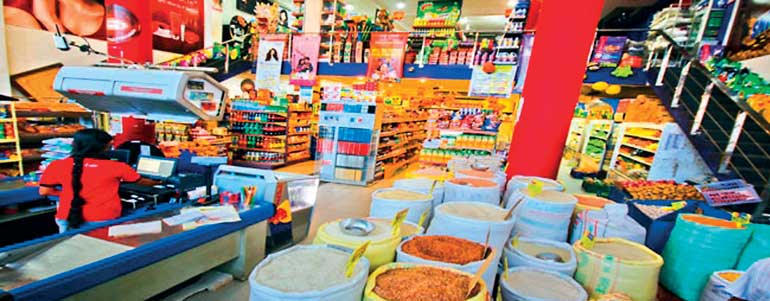Wednesday Feb 18, 2026
Wednesday Feb 18, 2026
Friday, 15 July 2016 00:00 - - {{hitsCtrl.values.hits}}

Currently there are 15 items declared as essential and the decision will be taken by the Cabinet to increase or decrease the items based on the needs and challenges of the consumer
 Essential consumer items
Essential consumer items
It is learnt that the Cabinet will be deciding next Tuesday that VAT will not be added to essential consumer items, and further items will be declared essential so that the Consumer Affairs Authority will be directing traders a maximum price for the identified items.
Currently there are 15 such items declared as essential and the decision will be taken by the Cabinet to increase or decrease the items based on the needs and challenges of the consumer which gives a broader meaning in Sri Lankan context compared to the definition worldwide. (Section 74 of the Act: Any actual or potential user of any goods or services made available for consideration by any trader or manufacturer).
This is a matter that should have taken by the Governance at the introduction of the VAT fiasco to ease the burden on the consumer. Now even the implementation of the Budget proposals on VAT is not finalised as the draft bill is to be presented to the Parliament to give legal status.
It is tactically a mistake to increase VAT without amending the tax structure with approval from the Parliament. This indicates how disorganised the implementation process and future strategy of both line Ministries concerned, namely Finance and Consumer Affairs, which comes under Industries. Cabinet may decide but the procedure in declaring the items essential is a long, cumbersome and complicated procedure subject to litigation.
Activist groups are planning to seek redress on the VAT fiasco via Parliamentary process and procedures. It is time for Finance and Industries (and Consumer Affairs) to work together with a common plan and strategy to avert the unrest and agitations of the consumer by smooth and careful implementation of the VAT and CAA systems with one voice/word.
Concept and procedure of price control under Consumer Practitioner Act and Control of Prices Act is replaced by the Consumer Affairs Authority Act which empowers regulation of prices under normal circumstances and special procedure on identified essential items if and when the line minister declares the item or items essential.
This follows that the price control and maintaining standards will be implemented by regulatory process under Section 9 to Section 33 of the Consumer Affairs Act, which deals with issue of directions, determining standards, Inquire into complaints, enter into agreements, acts against refusal to sell and many other regulatory powers not looked into and implemented by the CAA to ease the burden on the consumer and the governance.
Concept of price control and regularisation of consumer items and services
The line minister can implement this process only in consultation with the CAA and cannot take ad hoc decisions. The CAA has to do an authentic survey to be submitted to the Minister after a research and recommend the items identified by the Minister for the gazetted notification as required by the act.
It seems the Government was not ready and has not done homework with the sudden decision to increase VAT for consumer items without realising the complexity. There is no quick solution as the citizens and organisations may intervene in the decision-making process. Fortunately the consumer is not organised in Sri Lanka as in the other parts of the world. In this process the CAA can control the maximum price (MPC) of the identified consumer items only and the rest to be controlled by regulatory process which is the main difference of the CAA formulated on Western Australian/European and Canadian model which is replaced by the previous jurisprudence based on English Law.
Civil society and non-governmental organisations are busy with human rights with foreign findings, though consumer rights too are rights recognised by the UN and our Constitution as human rights of the consumer, not considered as essential, are a most neglected section of Sri Lankan society.
It is the duty of the CAA to organise and encourage consumer societies as required by Section 8 of the ACT which states as follows: “The functions of the authority shall be (f) to promote assist and encourage the establishment of consumer organisations.”
It is a pity that all over the world except in Sri Lanka consumerism and consumer organisation is a powerful powerbase of citizens and civil society organisations with a voice of the consumer consisting of citizens worldwide. Consumer organisations linked to education promote consumer education with regard to good health safety and security of consumers. How many such organisations are in existence and are active is a moot issue for the average consumer waiting for assistance in the resolution of the grievances.
Relevant legislation (Section 18) on essential items
According to Section 18 of the Consumer Affairs Authority, when the Minister is of the opinion that any goods or any services is essential to the life of the community, steps could be taken, having taken the appropriate steps legally to avoid litigation and protests from interested parties. Currently the 15 essential consumer items declared essential include sugar, dhal, onions, sprat, milk powder, and canned fish, which is shown in the CAA website.
Whether making some consumer items essential and adjusting the VAT will ease the burden on the citizen and bring down the cost of living is a moot issue and a dilemma/dream and to the consumer, as the root cause of the reasoning of cost of living is not confined to essential consumer items alone. It is unlikely this will be a viable solution as the issue lies elsewhere.
It may give a temporary relief, but will not be a permanent solution to the main issue of high cost of living which needs an overall solution based on a joint strategy with the participation of the trader/manufacturers, consumer and the government.
We must create an atmosphere for an alert consumer, reasonable trader/industrialist and effective consumer organisation with proper consumer education, and giving teeth and vision to the Consumer Affairs Authority with necessary amendments and adjustments. The consumer should know when, where, and how to buy the consumer items cheaper. He/she must be educated on priorities. The main expenses of the family today may be for tuition culture, mobile culture, electronic items and not necessarily food (healthy/non-junk) and other essentials for a healthy living citizen leading to a nation full of sicknesses with diabetes spreading even to children.
Implementation of the decisions taken by the CAA may not be an easy task with the staff of few hundred full of sheer inefficiency which is cancerous all over the State machinery. Will a few hundred staff be in a position to implement the decision to cover 22 million consumers? Obviously not. The only and the best way to implement the process countrywide is by way of education, organisation of the consumer and civil societies and implementation of a proper plan and strategy with organisations, media and extended civil society, now busy with politics and looking for others’ blood and faults.
Power of the consumer worldwide
‘Consumerism and consumer’ power in effective and powerful in the West, with concepts of Competition Law, Commercial Law and direct intervention of the government. In India the legal system has helped the process by setting up of consumer courts and it is a good idea for us to set up consumer courts and to use mediation boards as an intermediate measure/part between the parties, namely the trader/manufactures, consumer, and the government.
Our consumer law and practice jurisprudence is a mixture of Western, Australasian, and European modelled instruments and procedure. It is a good idea to consider reintroduction of the concepts of price control as before which is more effective and easy to implement. Until permanent solutions are found, it is the duty of the consumer, trader/industries and the government to work together for a viable solution for the consumer aggrieved and sandwiched all over. Priority should be given on consumer education and organisation and all sections of the society will have to be mobilised, including students, universities, schools and places of worship and all public places, working class, organisations, media by shelving petty party politics and other differences in the interest of the majority silently suffering, the most aggrieved and neglected section of society.
The Consumer Affairs Authority Act should be amended and simplified to meet modern demands and the challenges in the new world and economic order and developments as a main hub of South Asia strategically placed in the Indian Ocean.
(The writer is a former Chairman of the Consumer Affairs Authority and a former Ambassador. He can be reached via [email protected].)